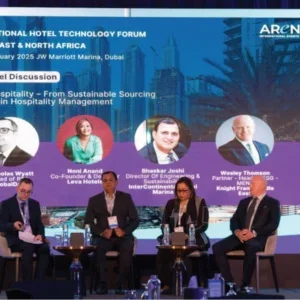
As winter fades away and we roll into spring, EHMA is exploring five key trends driving the hotel sector’s evolution: sustainability and green hospitality, workforce empowerment and experience-focused service, technological integration, culinary innovation and the growing influence of social media.
Sustainability and green hospitality
Sustainability has evolved from a buzzword into a fundamental expectation within the hospitality industry. In 2025, hotels are no longer just adopting environmentally friendly practices; they are aiming to create net-positive impacts on the planet. This evolution is fuelled by rising consumer demand for transparency and accountability in sustainability efforts.
Hotels are embracing innovative strategies to shrink their carbon footprints. For example, many source ingredients locally, a move that supports regional economies while reducing food miles. This approach not only elevates the culinary experience but also educates guests on sustainable practices, demonstrating that luxury and responsibility can go hand in hand.
Aligned with this shift, EHMA is reinforcing its commitment to sustainability. The General Assembly in Warsaw has adopted a new format focused on minimising environmental impact. This initiative reflects our collective responsibility to lead by example and promote corporate responsibility within our communities.
Workforce empowerment and experience-focused service
The hospitality industry continues to grapple with staffing shortages and high staff turnover rates. To address these challenges, hotels are increasingly focusing on workforce empowerment as a key strategy to enhance service quality. By prioritising employee well-being through improved working conditions, wages and mental health support, hotels can cultivate a motivated and engaged workforce.
In 2025, there is a growing trend towards flexible working arrangements, such as four-day working weeks, which cater to the evolving expectations of employees. Empowered and satisfied employees are more likely to deliver exceptional service, creating guest experiences that leave a lasting impression.
Hotels are also doubling down on experience-driven service, whereby the guest journey is carefully curated to ensure memorable interactions at every touchpoint. This approach requires hoteliers to understand guest preferences thoroughly and tailor their offerings accordingly. By fostering authentic connections between staff and guests, hotels can create unique experiences that resonate long after departure.
Technological integration
Technology is transforming the hospitality industry, revolutionising both operations and guest experiences. In 2025, advanced tools such as artificial intelligence (AI) and machine learning (ML) are becoming essential for enhancing personalisation and efficiency. AI-driven solutions allow hotels to tailor services to individual guest preferences. For instance, smart devices can automatically adjust room settings – such as lighting, temperature or entertainment – based on guests’ past behaviours, creating a customised experience from check-in to check-out. Nevertheless, true success lies in preserving the ‘soul of service’, ensuring that technology never overshadows the human dimension. Both guests and staff should benefit from innovation in ways that elevate, rather than replace, personal connection. The future of luxury hospitality is not about choosing between artificial intelligence and human intuition; rather, it is about crafting a symphony in which both play in perfect harmony, allowing staff to focus on empathetic, individualised care, and guests to enjoy a seamless yet genuinely human experience.
AI chatbots further enhance the guest journey by offering instant, round-the-clock responses to enquiries, ensuring seamless communication and support. Data analytics is also playing a pivotal role in decision-making. By leveraging real-time data, hotels can improve demand forecasting, optimise stock management and streamline operations. This not only results in cost savings but also ensures consistently high levels of service delivery, making the guest experience smoother and more satisfying than ever.
Culinary innovation
Culinary experiences have become a cornerstone of the overall guest journey. In 2025, hotels are reimagining their dining offerings with a focus on authenticity, creativity and cultural immersion. Guests are no longer simply seeking meals; they crave meaningful culinary adventures that celebrate local traditions and flavours.
To meet this demand, many fine-dining restaurants within hotels are partnering with renowned chefs who prioritise locally sourced ingredients. This not only enhances the quality and authenticity of the dining experience but also supports sustainability by reducing dependence on global supply chains. Hotels are embracing innovative concepts such as interactive cookery classes and farm-to-table experiences, allowing guests to connect with the origins of their food.
This shift aligns with the growing trend of wellness tourism, as more travellers prioritise health-conscious dining options tailored to specific dietary preferences and restrictions. By offering diverse menus that highlight fresh, high-quality ingredients and innovative preparation techniques, hotels can appeal to discerning diners seeking unique and memorable gastronomic experiences.
The influence of social media
Social media continues to be a game-changer in shaping how guests perceive and engage with hospitality brands. In 2025, platforms like Instagram and TikTok have become essential tools for hotels to tell authentic, compelling stories that resonate with potential guests. Eye-catching content that highlights unique experiences strongly influences booking decisions, making social media a powerful driver of demand.
Hotels that excel in leveraging social media not only boost their visibility but also build vibrant online communities of travellers. User-generated content – such as reviews, photos and videos shared by satisfied guests – serves as a credible and influential form of endorsement. Additionally, social media provides hotels with real-time insights into guest preferences, allowing them to refine their services promptly.
An active and responsive social media presence is key to building trust and loyalty. By engaging directly with guests – answering enquiries, addressing concerns and celebrating their stories – hoteliers can strengthen relationships and enhance brand reputation. In this digital age, an effective social media strategy is a vital part of creating lasting connections, staying competitive and positioning hotels as leaders in the industry.
Bridging past experiences with future opportunities
As we delve into these emerging trends – sustainability, workforce empowerment, technological integration, culinary innovation and social media influence – it becomes clear that they are interconnected forces shaping the future of luxury hospitality. EHMA’s dedication to redefining service standards across Europe’s luxury industry calls for a balance between learning from past experiences and seizing new opportunities for growth within our community.
By fostering collaboration among members through initiatives like the annual Best Practices Contest, themed ‘Why the Ultimate Hotel Guest Experience Matters’, we create a platform for sharing insights and inspiring innovation that elevates our collective standards. Together, we can ensure that our guests leave our hotels not just satisfied but genuinely valued, taking with them lasting memories of excellence and care. As we navigate the ever-evolving hospitality landscape, let’s embrace these trends with open minds and a spirit of innovation. This forward-thinking approach will not only shape our association’s mission but also solidify our position as leaders in luxury hospitality for years to come.






